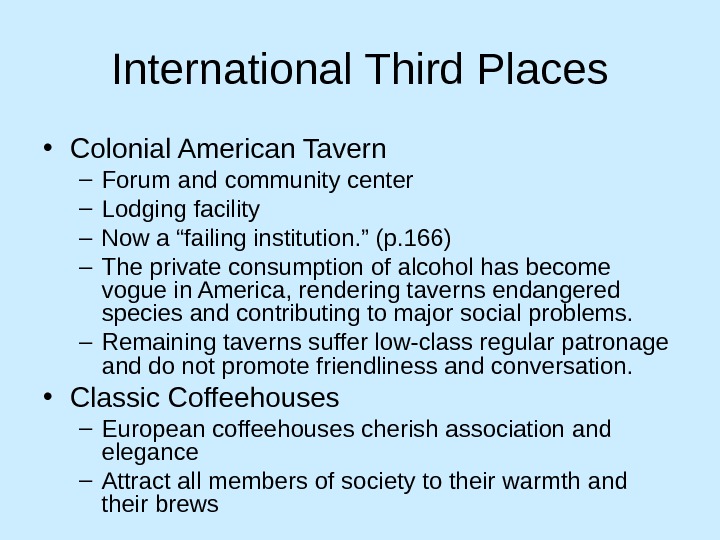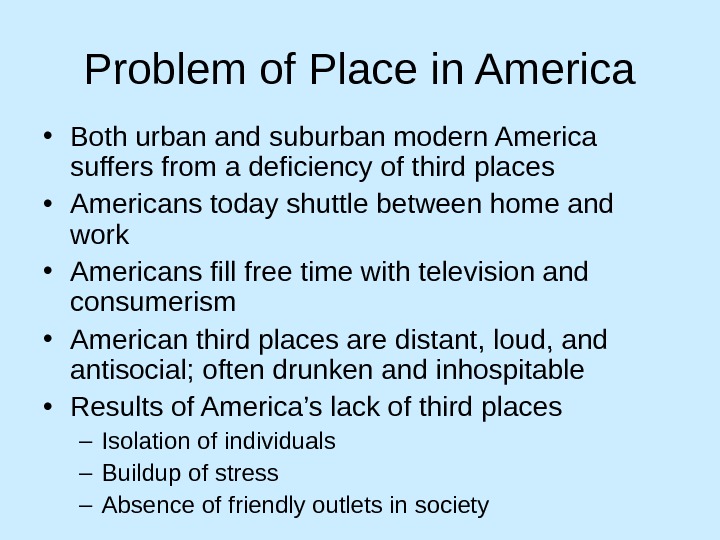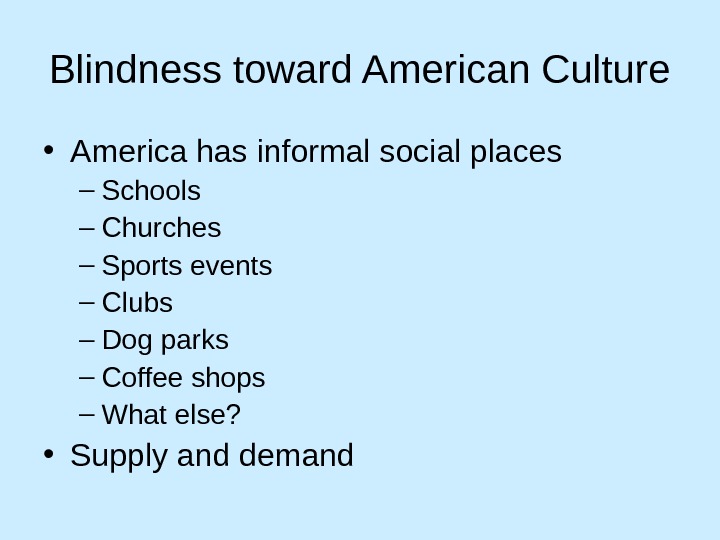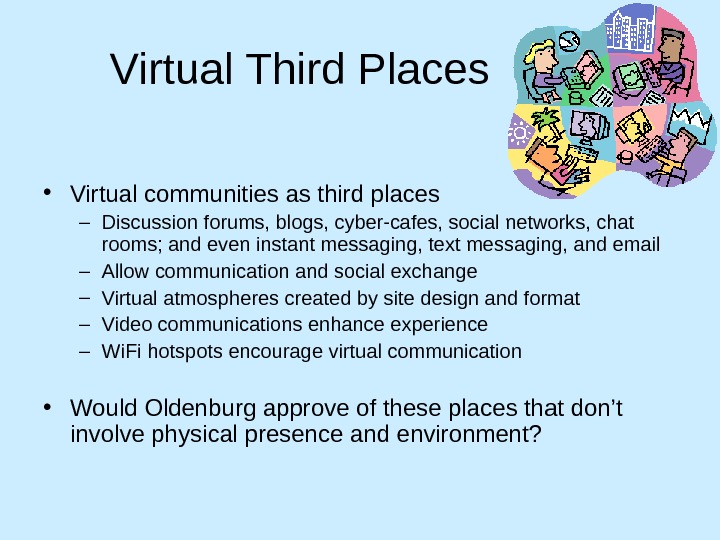Презентация ensley l-The Great Good Place Presentation
















ensley_l-the_great_good_place_presentation.ppt
- Размер: 635.5 Кб
- Количество слайдов: 16
Описание презентации Презентация ensley l-The Great Good Place Presentation по слайдам
 The Great Good Place: Cafes, Coffee Shops, Bookstores, Bars, Hair Salons, and Other Hangouts at the Heart of a Community by Ray Oldenburg Reviewed by: Lorrie Ensley Knowledge Management Systems • Spring
The Great Good Place: Cafes, Coffee Shops, Bookstores, Bars, Hair Salons, and Other Hangouts at the Heart of a Community by Ray Oldenburg Reviewed by: Lorrie Ensley Knowledge Management Systems • Spring
 Author and Publishing History • Book originally published in 1989 • Re-published in 1997 & 1999 with a new subtitle and preface • Ray Oldenburg is an urban sociologist at the University of West Florida in Pensacola, Florida. He writes about the importance of informal public gathering places
Author and Publishing History • Book originally published in 1989 • Re-published in 1997 & 1999 with a new subtitle and preface • Ray Oldenburg is an urban sociologist at the University of West Florida in Pensacola, Florida. He writes about the importance of informal public gathering places
 The Three Places • The First Place – Home • Place for rest and retreat • Place for family • Not a good place for friends to gather and socialize – Not everyone is comfortable in the setting – Usually not adequate furnishing and seating – Damageable personal objects are present
The Three Places • The First Place – Home • Place for rest and retreat • Place for family • Not a good place for friends to gather and socialize – Not everyone is comfortable in the setting – Usually not adequate furnishing and seating – Damageable personal objects are present
 The Three Places • The Second Place – Work • The setting is productive, structured, and competitive • This is where people earn a living • Inappropriate for leisurely, informal socializing
The Three Places • The Second Place – Work • The setting is productive, structured, and competitive • This is where people earn a living • Inappropriate for leisurely, informal socializing
 The Three Places The Third Place “ The core setting of informal public life” — leveler — low profile — full of friends — character — conversation
The Three Places The Third Place “ The core setting of informal public life” — leveler — low profile — full of friends — character — conversation
 Why are Third Places vital? • “ The leveling, primacy of conversation, certainty of meeting friends, looseness of structure, and eternal reign of the imp of fun all combine to set the stage for experiences unlikely to be found elsewhere. ” (p. 43) • Conversations in third places develop human relationships and understanding of society • Friendships that develop in third places fill the human need for “intimacy and affiliation. ” (p. 63) • Companionship and humor are “spiritual tonics” that enrich the lives of third place visitors. (p. 55 )
Why are Third Places vital? • “ The leveling, primacy of conversation, certainty of meeting friends, looseness of structure, and eternal reign of the imp of fun all combine to set the stage for experiences unlikely to be found elsewhere. ” (p. 43) • Conversations in third places develop human relationships and understanding of society • Friendships that develop in third places fill the human need for “intimacy and affiliation. ” (p. 63) • Companionship and humor are “spiritual tonics” that enrich the lives of third place visitors. (p. 55 )
 International Third Places • German Beer Garden (Old-world and Early-American) – “ Base of viable community life” (p. 90) – Hub of community activities – Welcomes all genders and ages – No prohibitive pricing • Main Street USA – Can stroll down the street to break activity and catch up on gossip – Children play on the sidewalks – Old-timers sit outside socializing
International Third Places • German Beer Garden (Old-world and Early-American) – “ Base of viable community life” (p. 90) – Hub of community activities – Welcomes all genders and ages – No prohibitive pricing • Main Street USA – Can stroll down the street to break activity and catch up on gossip – Children play on the sidewalks – Old-timers sit outside socializing
 International Third Places • English Pub – Multi-environment clubs, where rooms divide activity and create atmosphere – Is “superior to drinking establishments in most other cultures” (p. 125) in that it offers scale and warmth – Is welcoming and encourages laughter and leisure – “ Unlike the American tavern or cocktail lounge. . . enjoys a good press, an aura of respectability, and a high degree of integration in the life of citizenry. ” (p. 123) • Le Bistro (French Café) – Encourages visits of longer duration – Is scenic, inviting, and never a far walk from the modest French residence – “ The French expect more from their institution than do Americans, and theirs ha(ve) provided the tripodal base of the good life. The fulfillments of home and work coexist with a full, informal public life available to all French people” (p. 163).
International Third Places • English Pub – Multi-environment clubs, where rooms divide activity and create atmosphere – Is “superior to drinking establishments in most other cultures” (p. 125) in that it offers scale and warmth – Is welcoming and encourages laughter and leisure – “ Unlike the American tavern or cocktail lounge. . . enjoys a good press, an aura of respectability, and a high degree of integration in the life of citizenry. ” (p. 123) • Le Bistro (French Café) – Encourages visits of longer duration – Is scenic, inviting, and never a far walk from the modest French residence – “ The French expect more from their institution than do Americans, and theirs ha(ve) provided the tripodal base of the good life. The fulfillments of home and work coexist with a full, informal public life available to all French people” (p. 163).
 International Third Places • Colonial American Tavern – Forum and community center – Lodging facility – Now a “failing institution. ” (p. 166) – The private consumption of alcohol has become vogue in America, rendering taverns endangered species and contributing to major social problems. – Remaining taverns suffer low-class regular patronage and do not promote friendliness and conversation. • Classic Coffeehouses – European coffeehouses cherish association and elegance – Attract all members of society to their warmth and their brews
International Third Places • Colonial American Tavern – Forum and community center – Lodging facility – Now a “failing institution. ” (p. 166) – The private consumption of alcohol has become vogue in America, rendering taverns endangered species and contributing to major social problems. – Remaining taverns suffer low-class regular patronage and do not promote friendliness and conversation. • Classic Coffeehouses – European coffeehouses cherish association and elegance – Attract all members of society to their warmth and their brews
 Problem of Place in America • Both urban and suburban modern America suffers from a deficiency of third places • Americans today shuttle between home and work • Americans fill free time with television and consumerism • American third places are distant, loud, and antisocial; often drunken and inhospitable • Results of America’s lack of third places – Isolation of individuals – Buildup of stress – Absence of friendly outlets in society
Problem of Place in America • Both urban and suburban modern America suffers from a deficiency of third places • Americans today shuttle between home and work • Americans fill free time with television and consumerism • American third places are distant, loud, and antisocial; often drunken and inhospitable • Results of America’s lack of third places – Isolation of individuals – Buildup of stress – Absence of friendly outlets in society
 Forces that Threaten Third Places • Hostile habitats – Urban sprawl • Problems with patronage – Gender • Importance of bonding within the genders • Need for male-bonding institutions – Age • children are “undesirabl(e). . . in our present culture” (p. 266) and are either overlooked or overscheduled • Teenagers are socialized at shopping malls that focus on consumerism • Oldenburg advocates the defragmentation of American society and return to a lifestyle that includes a positive, public social sphere • His parting plea to “those who despair of suburbia’s lifeless streets, of the plastic places along our ‘strips, ’ or of the congested and inhospitable mess that is ‘downtown, ’ is: It doesn’t have to be like this!” (p. 296)
Forces that Threaten Third Places • Hostile habitats – Urban sprawl • Problems with patronage – Gender • Importance of bonding within the genders • Need for male-bonding institutions – Age • children are “undesirabl(e). . . in our present culture” (p. 266) and are either overlooked or overscheduled • Teenagers are socialized at shopping malls that focus on consumerism • Oldenburg advocates the defragmentation of American society and return to a lifestyle that includes a positive, public social sphere • His parting plea to “those who despair of suburbia’s lifeless streets, of the plastic places along our ‘strips, ’ or of the congested and inhospitable mess that is ‘downtown, ’ is: It doesn’t have to be like this!” (p. 296)
 Review of Book • Explorations of third places are intriguing • International examples interesting, but limited to Western cultures • Socialness is an attractive concept • Arguments are occasionally anecdotal, highly-biased, and outrageous • Criticism and narrow-view of American likely offensive to many readers
Review of Book • Explorations of third places are intriguing • International examples interesting, but limited to Western cultures • Socialness is an attractive concept • Arguments are occasionally anecdotal, highly-biased, and outrageous • Criticism and narrow-view of American likely offensive to many readers
 Good points GGP • Raises issues about social environments • Forces of social interaction • Benefits of social interaction • Explorations into different cultures
Good points GGP • Raises issues about social environments • Forces of social interaction • Benefits of social interaction • Explorations into different cultures
 Criticism about GGP • Unsupported statements – Anecdotal support – Inconsistent statements about drinking and intoxication • “ European bars do not encourage compulsive drinking, as do those in the United States. ” (p. 160) • “ Germans valued reduced potency above taste. ” (p. 90) • Outrageous statements – “ I recently chatted with a practicing psychiatrist all too familiar with wife-beating. He lamented the decline of the neighborhood tavern in which he felt men could ‘let off steam’ and not have to ‘take everything out on their wives. ’ He was convinced that much of the irrational aggression and violence of the wife-beater is due to the lack of safety valves such as the lively tavern once offered to a far greater proportion of the population than it does today. My suspicion is that a good tavern keeps ‘steam’ from building up more than it provides a means to ‘blow it off, ’ but there seems ample evidence to support both views” (p. 80).
Criticism about GGP • Unsupported statements – Anecdotal support – Inconsistent statements about drinking and intoxication • “ European bars do not encourage compulsive drinking, as do those in the United States. ” (p. 160) • “ Germans valued reduced potency above taste. ” (p. 90) • Outrageous statements – “ I recently chatted with a practicing psychiatrist all too familiar with wife-beating. He lamented the decline of the neighborhood tavern in which he felt men could ‘let off steam’ and not have to ‘take everything out on their wives. ’ He was convinced that much of the irrational aggression and violence of the wife-beater is due to the lack of safety valves such as the lively tavern once offered to a far greater proportion of the population than it does today. My suspicion is that a good tavern keeps ‘steam’ from building up more than it provides a means to ‘blow it off, ’ but there seems ample evidence to support both views” (p. 80).
 Blindness toward American Culture • America has informal social places – Schools – Churches – Sports events – Clubs – Dog parks – Coffee shops – What else? • Supply and demand
Blindness toward American Culture • America has informal social places – Schools – Churches – Sports events – Clubs – Dog parks – Coffee shops – What else? • Supply and demand
 Virtual Third Places • Virtual communities as third places – Discussion forums, blogs, cyber-cafes, social networks, chat rooms; and even instant messaging, text messaging, and email – Allow communication and social exchange – Virtual atmospheres created by site design and format – Video communications enhance experience – Wi. Fi hotspots encourage virtual communication • Would Oldenburg approve of these places that don’t involve physical presence and environment?
Virtual Third Places • Virtual communities as third places – Discussion forums, blogs, cyber-cafes, social networks, chat rooms; and even instant messaging, text messaging, and email – Allow communication and social exchange – Virtual atmospheres created by site design and format – Video communications enhance experience – Wi. Fi hotspots encourage virtual communication • Would Oldenburg approve of these places that don’t involve physical presence and environment?
